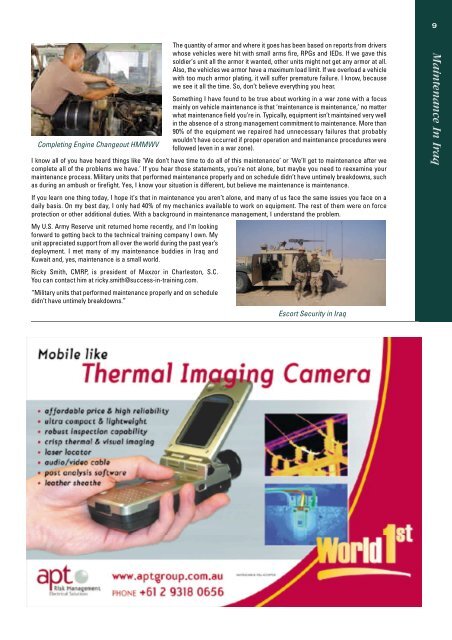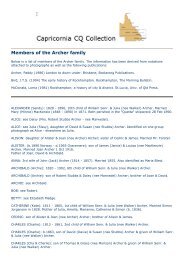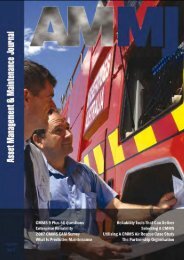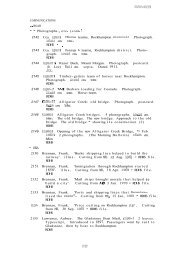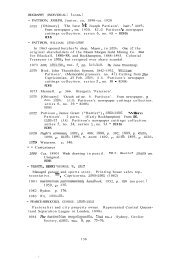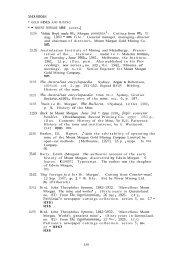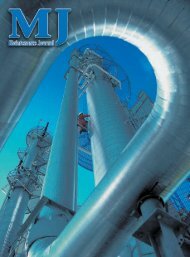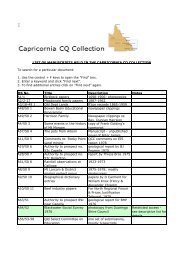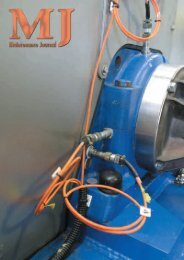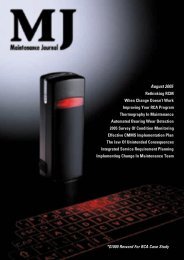October - Library - Central Queensland University
October - Library - Central Queensland University
October - Library - Central Queensland University
You also want an ePaper? Increase the reach of your titles
YUMPU automatically turns print PDFs into web optimized ePapers that Google loves.
Completing Engine Changeout HMMWV<br />
The quantity of armor and where it goes has been based on re p o rts from drivers<br />
whose vehicles were hit with small arms fire, RPGs and IEDs. If we gave this<br />
soldier’s unit all the armor it wanted, other units might not get any armor at all.<br />
Also, the vehicles we armor have a maximum load limit. If we overload a vehicle<br />
with too much armor plating, it will suffer pre m a t u re failure. I know, because<br />
we see it all the time. So, don’t believe everything you hear.<br />
Something I have found to be true about working in a war zone with a focus<br />
mainly on vehicle maintenance is that ‘maintenance is maintenance,’ no matter<br />
what maintenance field you’re in. Ty p i c a l l y, equipment isn’t maintained very well<br />
in the absence of a strong management commitment to maintenance. More than<br />
90% of the equipment we re p a i red had unnecessary failures that pro b a b l y<br />
w o u l d n ’t have occurred if proper operation and maintenance pro c e d u res were<br />
followed (even in a war zone).<br />
I know all of you have heard things like ‘We don’t have time to do all of this maintenance’ or ‘We’ll get to maintenance after we<br />
complete all of the problems we have.’ If you hear those statements, you’re not alone, but maybe you need to reexamine your<br />
maintenance process. Military units that performed maintenance properly and on schedule didn’t have untimely breakdowns, such<br />
as during an ambush or firefight. Yes, I know your situation is different, but believe me maintenance is maintenance.<br />
If you learn one thing today, I hope it’s that in maintenance you aren’t alone, and many of us face the same issues you face on a<br />
daily basis. On my best day, I only had 40% of my mechanics available to work on equipment. The rest of them were on forc e<br />
protection or other additional duties. With a background in maintenance management, I understand the problem.<br />
My U.S. Army Reserve unit re t u rned home re c e n t l y, and I’m looking<br />
forward to getting back to the technical training company I own. My<br />
unit appreciated support from all over the world during the past year’s<br />
deployment. I met many of my maintenance buddies in Iraq and<br />
Kuwait and, yes, maintenance is a small world.<br />
Ricky Smith, CMRP, is president of Maxzor in Charleston, S.C.<br />
You can contact him at ricky.smith@success-in-training.com.<br />
“ M i l i t a ry units that perf o rmed maintenance properly and on schedule<br />
didn’t have untimely breakdowns.”<br />
Escort Security in Iraq<br />
9<br />
9


